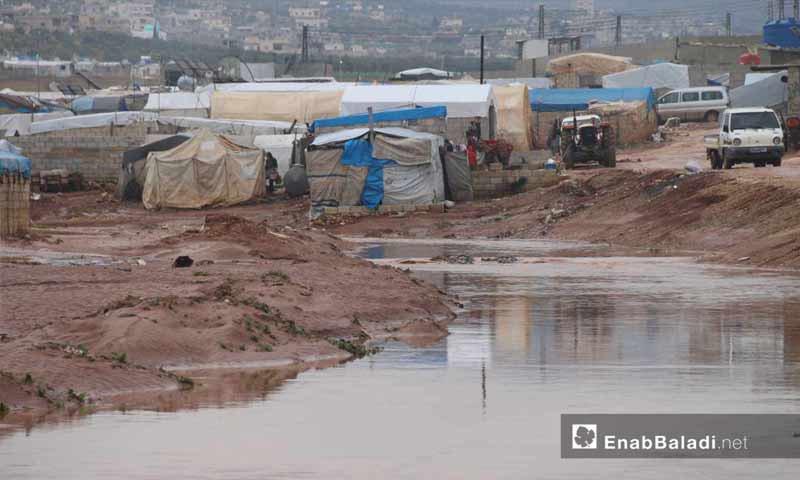Last week heavy rain struck different parts of Idlib province, exacerbating the suffering of internally displaced people (IDPs). The heavy rainfall cut off roads, obstructed movement between tents and turned the camps in low-lying areas into large swamps. The torrential rain has brought back to the IDPs memories of harsh cold winters they suffered in the previous years.
With the winter creeping into Idlib, the most urgent priority for IDPs is now to prepare themselves and the camps for the season. They have already resorted to using different old techniques for staying warm due to the difficult economic conditions.
Alternative sources of fuel
Mustafa Yassin, a diesel dealer in Idlib, tells Enab Baladi that most IDPs cannot afford the cost of fuel. Therefore, they resort to burn their torn-out clothes and shoes or maybe not to install heaters at all. Yassin added that “the price of diesel fuel reached 400 Syrian pounds for one litre (0.7 USD). This is due to roadblocks because of Operation Peace Spring in east of the Euphrates.”
Other residents and IDPs in the province of Idlib rely on wood and straw as heat sources, according to activist and journalist Rana Melhem from the town of Ihsim in the southern countryside of Idlib. Melhem told Enab Baladi that, “I see every day in the Qalaa camp, which was set up five months ago in Sarmada, women collecting wood and some dry straw for heating, indicating that women live in camps which lack the minimum standards of living.”
Damaged tents
In summer, tents protect its residents against the blazing sun while in winter living in tents is very difficult, given that most of the tents in the camps of northern Syria are made of canvas or plastic and they cannot withstand wind or heavy rains.
The director of the Hafsa camp in the countryside of Maarat al-Nu’man, Juma al-Alaiwi, talked to Enab Baladi about the problems of tents in northern Syria, pointing out that most of them are worn and unfit for use.
“The constant shelling on Maarat al-Nu’man led to further waves of displacements and overcrowding in camps. Therefore, we headed to northern Syria to build another camp, but to no avail in the absence of organizational support. However, we had to come back to the Hafsa camp despite the continued shelling.”
As a result, many families are forced to live in second-hand tents while other families found no place to seek shelter, according to al-Alaiwi.
The Hafsa camp is home for 1,150 people who were displaced from the countryside areas of the provinces of Idlib and Hama.
Current initiatives
The coordinator of the heating project, funded by Mercy-USA, Wasel al-Thiab, confirmed in an interview with Enab Baladi, that the organization targets the newly displaced people in northern Syria. The project includes distributing pyrene to families in the 19 camps in Kili, providing 900 kilograms of flammable material in three batches over the next three months, in addition to providing a fireplace for each family. The distribution will start next month.
Al-Thiab highlighted that the winter crisis is a recurring one, pointing out that the displaced have been suffering for more than five years and their suffering becomes more intense every day.
He said, “at the beginning of every winter, appeals are launched for saving the camp residents and for taking the necessary measures to reduce the adverse impacts of storms and heavy rain, through fixing tents worn by weather conditions, gravelling the roads around and inside the camp and creating drainage channels for draining off rainwater.
However, carrying out these tasks including securing heavy equipment, canvas fabric and some essential supplies requires material and logistical support. The camp residents cannot afford them. Supporting organizations and donors should work together to cover the needs of camps in northern Syria.

